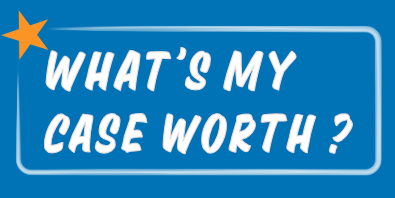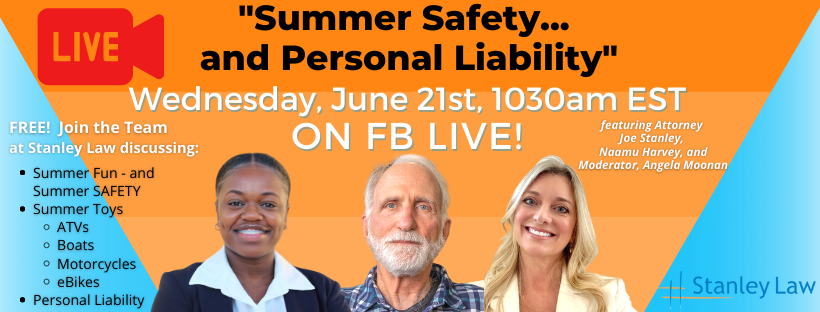Let’s talk about Summer Safety & Personal Liability! Welcome Naamu Harvey, a summer intern on the team and a student at Syracuse University. Good morning, Naamu, and welcome to Joe Stanley. Of course, Joe knows, and once again, we are doing a webinar to support you knowing your rights, knowing your liabilities, understanding that an ounce of prevention is worth a pound of cure, as Joe would say. So, today we are talking summer safety and personal liability. So all things ATVs, boating, e-bikes, pool parties, RV/Camping. You want be sure that you and your family and loved ones friends, anyone who walks onto your property or onto your boat, et cetera, rides your ATV, that you’re safe and taking all necessary precautions. Cuz Joe, we want people to have fun, right? But we want them to also keep in mind at the very same time, it’s important to be smart. So with that, I’m going to turn this over to Joe, and then we can begin with your slides.
Joe:
Well, we get calls about people getting hurt all the time. And summertime has its own special challenges. Summer safety and liaiblity presents its’ own unique challenges for families. And a lot of things we’re going to talk about are things that really do happen. And that unfortunately, if you don’t plan for safety and plan for what you’re gonna do, if something unfortunate does happen, it’s too late when it does. And this is just a reminder about everybody has fun. And yes, every 90% of the time, or 95% of the time, nothing happens, even when people are doing stupid stuff, nothing happens. Unfortunately, that 5%, seems to be getting bigger every year for whatever reason. This is a way to protect you, your family, and those who are celebrating the summer with you. We’ll just go in the order of the slides and that way I can keep myself on track and Naamu’s going to tell us about, you know, when I was her age, I’m sure I engaged in behaviors that may have been stupid at some times. And, no, I didn’t post those on the internet or post ’em on social media. Fortunately they weren’t posted, so there’s no record and there’s no recollection anymore either (laughter).
Angela:
We’ve all been there. No one’s immune to it. So with that, I’m gonna pull up your slides.
Yes. RV and camping. So much fun. Pool parties. So, okay. In fact, I just, as I was going to say, Naamu is helping us with this. We just went on TikTok. There was a great TikTok video actually of Stephanie Viscelli, an attorney at Stanley Law who talked about pool safety in particular and how to be safe. And I actually learned something about pool safety that I thought I knew and didn’t know. First, we’re talking E-bikes.
Joe:
Well, e-bikes are, this is something that of course I had to be familiarize myself with because people confuse and, don’t really understand that e-bikes, mopeds and scooters, e-bikes are electrified bikes. And as this outlines, there are three different classes of e-bikes. The one thing that needs to be understood is that these are a substitute for bicycles and sense that they are regulated as bicycles. And so these are the classifications. E-bikes are not motor vehicles, which is important for insurance purposes. They are bicycles. And as you can see, class one and two e-bikes are permitted on any public road bike path or trail, or bicycles are allowed. Class three e-bikes are restricted from using bicycle lanes path or trails, unless specifically allowed by local authorities. You have to be 16 years of age to operate. And if you’re under 12, you have to wear a helmet. But of course everyone should wear a helmet or when you’re engaging in any kind of activity that involves the potential for a fall.
Angela:
Now interestingly, Joe, my daughter was coming around a corner, this is a couple of summers ago. And on her own road to her house, which is a private road and coming around the corner was another vehicle, oncoming traffic vehicle. But then an e-bike was in her lane heading right toward her because he was passing the vehicle like a vehicle would. And she took the ditch and the e-bike rider for whatever reason made a bad choice and also took the same exact ditch went left. She went right and he went left and he hit her… $3,500 damage to the front of her vehicle. And when I called my insurance company, they said, guess what? What did they say, Joe?
Joe:
Well, there’s a big crossover as to what these are. And sometimes these vehicles can go faster than they’re permitted. They’re supposed to only go 20 miles per hour or whatever. But since they’re not motor vehicles, they don’t have to be registered and subject to separate insurance. They are covered by homeowners insurance and rental policies. Just like if you were riding a regular bicycle. Unfortunately, a lot of people riding and operating these vehicles aren’t members of a household that has homeowners insurance or rental’s insurance. And when these bikes are being rented, the loss to me is unclear. For instance, the city of Syracuse has these e-bikes all the place. Do they have any legal responsibility for the various in sundry people that are out riding these bikes? Right? And not using them properly, right? Interesting. I don’t know about the law about that. I think there are going to be more cases. They’re gonna flesh that out. But the bottom line is if you wanna be safe, you operate them properly. You don’t soup them up. You don’t make ’em go faster than 20 miles an hour. By the way, I was on a trail a week ago and there was a couple of these went by me. They were going, if they were going 20 miles an hour, it seemed awfully fast when you’re walking along the trail.
Angela:
And they do come out of nowhere. It’s just like some of those motorcycles that are affectionately called crotch rockets… when they come out of nowhere cause they’re going a hundred miles an hour. The e-bikes feel that way too. Like you said, Joe, it’s all perspective when you’re just walking, you know, and one of these fly by you. Just like with a snowmobile or anything, when you’re talking about speed, Joe, you’re talking about a twig, something comes out, a dog, something comes out in front of you and when you’ve got speed behind you and all that momentum, you’ve got very little time to react.
Joe:
Well, and again, speed is relative to how fast you’re going also. So, a lot of these get confused with mopeds and scooters and dirt bikes and those things. As such, those are all classified as motor vehicles and are supposed to be registered and insured. And those are not covered by homeowners or rental policies the same way ATVs are not covered, which we’ll get to them.
Angela:
Have you ever ridden one Naamu? Have you ever ridden an e-bike?
Naamu:
I’ve personally never ridden an e-bike, but I have tried one of the electric scooters when I was in New York City a couple times.
Joe:
Did they have license plates on them?
Naamu:
I don’t recall any license plate or anything like that.
Joe:
Yeah, well see that’s part of the issue. They are supposed to, those are motorized vehicles. Training is always important. So this is just to let people know this is an ongoing field. If you’re gonna operate them, be careful. You also have to keep an eye out for them. Cuz I think they’re gonna increase in usage.
Boating
Just like every boat is supposed to be registered. You should always insure your boat. And there are all sorts of rules and regulations about boating. First of all, everybody now essentially in New York, should have to have a boat or safety course in order to operate a boat in New York. I think the exemption… it’s only like people born before a certain year that are exempt if you have a driver’s license. I have to take the course even though I think I took it 20 years ago. I have to take it again. So, you’re supposed to have the course to be able to drive and you could be subject to a ticket and fine if you don’t; there are numerous regulations. If you own a boat, you should be aware of all the equipment you have on a boat. I’m not gonna go through it. Insurance on a boat is of critical importance. I’ve handled some very tragic cases over the years in which devastating injuries have occurred on boats that were not insured. And you do not want to be personally liable for a bad event that happens on a boat.
Angela:
Every summer there’s more than one typically tragic headline about boating accidents.
Joe:
Yes. And it’s usually related to alcohol.
Naamu:
I was just going to say that, especially if you’re driving a boat, I think there should be at least one DD on the boat who’s driving, who’s not drinking.
Joe:
Yes. And in fact you get charged. It goes on your regular driver’s license and insurance if you drive a drunk on a boat. So you have serious consequences. Alcohol and boats run together, but they shouldn’t be in the driving department.
Angela:
They teach a boating safety course I think in all of the high schools, don’t they?
Joe:
And, there are different issues with jet skis and personal watercraft, whatever they wanna call them. There have been a lot of issues with them.
Angela:
And anyone under the age of 12 must have a life jacket on. Anyone using a personal watercraft must wear a life jacket and anyone being towed.
Joe:
Interesting. All common sense. Those really shouldn’t have to be imposed by law.
Angela:
ATVs, so Naamu,have you ridden ATVs? I think you mentioned you had…
Naamu:
Yes, I rode a couple outside the country maybe one or twice.
Angela:
Right. Because on a lot of different trips and excursions and things like that, you can get them on the islands and to take yourself around the island, et cetera.
Joe:
Right. Did you have a helmet when you used them?
Naamu:
You know what, I honestly feel like I didn’t, but oh actually, I did!I have a picture and I did have a helmet on.
Angela:
“I have a picture, I have photographic evidence. Joe!” <laugh>,
Joe:
Because I ask that question and most people they don’t even think about it
Naamu:
You don’t need a license to ride one. So one of my friends, she’s from the city and she doesn’t have a license. So the ride did get a little bit scary because she doesn’t know how to drive. But I think you should have a license for an ATV.
SJoe:
This is a true point. Some of these are and some are not intuitive. UTVs and ATVs operate differently than cars also. Essentially they’re supposed to be registered and they should always be insured. Most people don’t insure them. They’re not covered by a homeowners’ policy or a rental policy. So if they’re not insured and you’re using them even on your own property, you might think they’re covered. They are absolutely not.
Angela:
So, the e-bikes are covered by your homeowners. You could be anywhere, right? And they’re covered by your homeowners or rental. But your ATVs, you could be out on your farm, on your property, et cetera. And that’s where a lot of them are ridden…
Joe:
Typically. Well, the farm vehicle, they, they may be classified as a farm vehicle and covered under a farm policy. But a regular homeowner, because ATVs can be considered agricultural equipment, right? So that’s a little bit different. But ATVs, and mopeds and UTVs are motorized vehicles and they are always excluded from homeowners and rental policies. E-bikes are not considered motor vehicles, although in some states they are and they wouldn’t be covered at all. Colorado being one that comes to mind.
Under 10 years old: And I know people who allow their children under 10 to operate them. They’re not supposed to be. And you’re supposed to have completed this course and they’re supposed to be supervised. This presents all sorts of legal liability. If you let somebody operate your UTV who’s under 16, you’re exposing yourself to all sorts of liability. Especially if you have an uninsured ATV,which most of them are, right. So you’re entrusting someone, someone who you haven’t trained. And by law they’re supposed to have training.
Angela:
Joe, we have a question. What does UTV mean?
Joe:
It’s a utility terrain vehicle. They’re like mini trucks. They’re ATVs with the baskets on the back. They’re utility.
Anegla:
Okay. Like those gators, would that be?
Joe:
Yes. They have the utility functionality. But they’re the same rules by the way. You can have the same issues with entrusting a UTV or an ATV to someone who’s over 16 if they don’t know what they’re doing. And if you don’t have insurance, that’s a huge problem. And this is all again, common sense safety issues.
Naamu:
But you know, Joe, it might not be common sense to people my age because I didn’t even think about ATV insurance. Home insurance when you’re having a pool party. Those thoughts like that would never cross my mind before working here.
Joe:
Well, and again, that’s why we do these and how many times do I see people riding ATVs that don’t have helmets on, I mean all the time. Say eye protection or gloves <laugh>. I can tell you that the last time I saw somebody wearing goggles using an atv, it might have been the first, but <laugh>, it’s the same thing withalcohol with any of these. It’s a bad, bad idea.
Angela:
So Joe, do the rules apply on an ATV with respect to alcohol and drugs as they would for boating and vehicles?
Joe:
No, not yet. But you still get arrested. If you’re operating one, you’ll still get arrested. It’s still a violation. It doesn’t go over on your driver’s license. I don’t think so. They were talking about doing that. They may have, but I don’t think so yet. But it’s still a big charge anyways. If you’re operating in on a public road, it doesn’t really matter.
Angela:
Right. Okay. And, by the way, on that last point, within your skill level and at a safe and appropriate speed, I would think ATVs, the bulk of of issues are with speed
Joe:
And alcohol.
Angela:
If you’re just put putting around on a trail on an atv, there’s very little chance you’re gonna get hurt. It’s the daredevil. Right.
Joe:
Well, AND watching what you’re doing, like everything else.
Angela:
Distraction. Sure. Okay.
Joe:
Camping and RVs Just a reminder, make sure that your vehicle and your trailer, we’ve talked about this, people have tires, trailers, camping trailers or whatever, tires on trailers and inspections on trailers are always an issue. Remember they’re supposed to be separately inspected <laugh> and you’ll get a ticket if you don’t, tires are notoriously bad on these. And also, people who don’t drive RVs regularly need to acquaint themselves with them when you get them out on the road.
Angela:
There are no courses in that are there, Joe, unlike your boating or for snowmobiling?
Joe:
No. there aren’t.
Angela:
You just have to learn through trial and error in a big old parking lot. I guess.
Joe:
People hauling trailers don’t really know a lot about what they’re doing either. But as a reminder with RVs and campers, smoke carbon monoxide detectors on boats where people sleep and their heaters, campers and RVs are just as relevant during the summer. There are surprisingly large numbers of deaths from carbon monoxide poisoning.
Angela:
Remember that years ago, Joe, it was so sad. Wasn’t it out in Brewerton? There was like a man and his girlfriend. Do you remember that story?
Joe:
Yeah. Well, it was on a boat. But it happens, it happens in RVs. It happens. Well, it happens in hotel rooms. I mean, we just had it in the news a couple in Mexico, carbon monoxide’s an insidious thing. And it’s not just a wintertime thing.
Lets’ talk about pool parties and summer events, which we can wrap up with graduation parties and pool parties and parties in general. If you are sponsoring a party, you on your property or you’re sponsoring a party and it’s not even on your property, do you have legal liability or making sure that the events are safe? Interesting question. When it’s not on your property, if you’re actually sponsoring it, there’s liability, but there are a lot of social media events that are sponsored parties, so to speak, that you are sponsoring a party to come here or come there and lots of people show up. And then sometimes bad things happen because there’s too many people, there’s not any supervision. Do you have legal liability for that?
You may very well have legal liability. Most of the time there are no assets for people to go after. But you know, if you sponsor an event and you know, or should know that there’s gonna be problems or you don’t take any effort to make sure there isn’t, you may have legal liability. Social media generates all sorts of things different than just a regular party that you’re gonna have for graduation or just for the summer. If you’re gonna have an event at your house, you have a responsibility to make sure that the people coming are reasonably safe. That’s the same rule there is for everything. And so what does that mean? If there’s a dangerous condition, you need to correct it. If a dangerous condition arises, you need to take some steps to prevent it. You can’t serve alcohol to minors and that’s under 21. There’s strict liability for that. That is a big no-no. By the way, if you’re an adult and you’re serving under 21, whether you think that should be the law or not, it’s still a strict liability issue causeing problems over the years. And even for adults, if you serve a visibly intoxicated adult and they go out and do something, you may be legally responsible.
Angela:
So let’s put up a scenario here. And Naamu, you may have been in this kind of scenario as well. Joe, you talked about an offsite party. So let’s say, okay, I’m gonna throw a graduation party, I’m gonna rent a facility. Maybe it’s a vfw, maybe it’s an American Legion, maybe it’s just a pub, you know, a party venue …
Joe:
It’s the public park, maybe
Angela:
So you are throwing the party, but it’s not on your property and someone under 21 consumes alcohol. You’re responsible?
Joe:
Well, are they consuming it or are you giving it to them? Are you providing it? It’s not a consumption issue. It’s you providing it. I mean, are you responsible for people who come and bring it in? I mean, there are all sorts of security issues and that’s part of the problem. Without throwing a party in an unrestricted space, there’s the risk of all sorts of unknowns and un unpredictables happening, which is the problem with the social media party is that you may intend to only invite five 50 people and you end up with 500 and there you get to those levels, it’s an uncontrollable mess.
Angela:
Naamu, have you ever been a part of that where someone, whether through the university, something like that, where somebody starts a party and then suddenly it’s huge?
Naamu:
Yes, I’ve been to several of those in high school and in college where you just see it on social media and you just go, you show up. There’s tens of hundreds of people there just hanging out.
Joe:
Yes. And if you’re the landlord or you’re the tenant there, and that usually that grounds to get you immediately kicked out of your apartment. Because there are now huge restrictions on that
Naamu:
Well see, most of our parties are at public areas, so…
Joe:
Since there’s a digital track record, I post that and I’m saying there’s a party. Assuming the person posting it, he has no assets. So he doesn’t care if he gets sued. But I’m saying if you post it, come and have a party, there’s gonna be whatever it is available. You know, I don’t know what you’re promising. Everybody’s getting together to do whatever, but you could theoretically be responsible for sponsoring a party where bad things happened because you either knew or should have known that events were gonna get out of control or you didn’t even take any steps to care. They’ve gone after Airbnb for these kind of issues because things have gone out of control. They go after landlords and tenants who have them on their property because okay, yeah, “we didn’t know all these people were gonna show up.” Well, they did! You didn’t do anything about it. Lawyers can only pursue cases where there’s a reasonable chance of helping somebody out and going after somebody that has no assets is a fool’s err.
Angela:
What’s a case, Joe, that for whatever reason kind of sticks out in your mind over the years around personal liability and parties, etc?
Joe:
I’ve had a terrible boating accident case, horrific injuries where there was no insurance for a young girl. I really couldn’t help her because there was no insurance and it was her father’s fault and he didn’t have any insurance. I’ve had ATV accidents on people’s property where they let teenagers operate them. They have no idea what they’re doing and have gotten horrific injuries. You know, they have a couple acres of land and they just let ’em go. No helmets, no training, no anything. And you know, you get teenagers and even when they know what they’re doing, they do kind of crazy things. So it happens with dirt bikes, it happens with ATVs. You don’t wanna be in that scenario. You want everybody to enjoy it and be safe because again, all the money in the world isn’t gonna bring you back from the devastating injuries that these people suffer if you go ahead and engage in these things unwisely.
Angela:
Every month or two we do an educational webinar just like this one, to educate, support, advocate and inform. And you can go on the Stanley Law Offices’ YouTube channel, and you can view all of these webinars. You can also see them on Stanleylawoffices.com under ‘webinars.’ There are also videos in both of those places, the website and on YouTube that are some of the most frequently asked questions that the firm gets around. Personal injury, workers’ compensation, social security, slip and falls… in Joe’s language we call premises liabilities. You,slip and fall, get hurt on someone else’s property, whether it be municipal or private property. And, the videos are super helpful and we encourage you to avail yourselves of those because they’re free! And all phone calls, all consultations with Joe and the team at Stanley Law are free and confidential. So if you have any legal questions relating to personal injury or not, Joe, because you take those questions on your radio shows all week long… legal questions, just trying to be helpful. You can phone the office at 1-800-608-3333. Again, it’s stanleylawoffices.com. Follow Stanley Law on TikTok. Follow, comment, like, share, send us questions
Joe also has a very near and dear charitable cause called Music for the Mission. You can find it at music for the mission.org. Lot of great summer events in Hanover Square, starting in a month or so. We’ve got a big event tomorrow in Binghamton in the southern tier, to benefit CHOW, a wonderful organization who helps serve meals stockpile food pantries, et cetera, uh, for those in need.
Thank You Naamu. Thank you so much Joe as always. You’ll be able to, to view this video, certainly share it, comment, etc, as it’ll be on Facebook archived as well as up on the website and our YouTube channel. Stay safe, have fun out there. All enjoy. And we’ll see you on social media!














